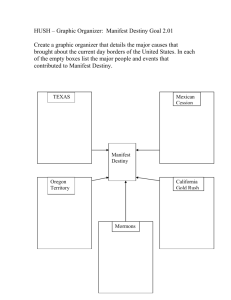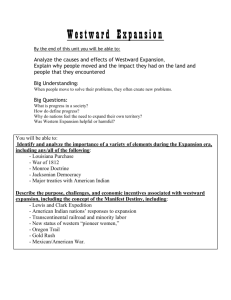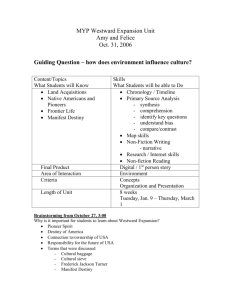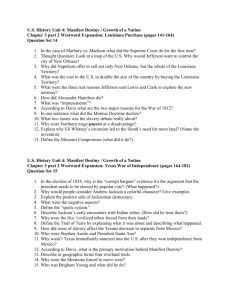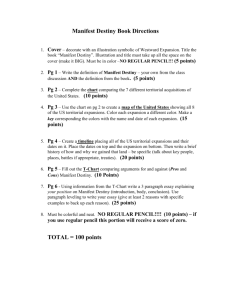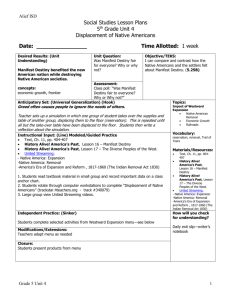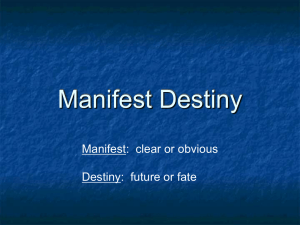On The Move! Teacher Template
advertisement
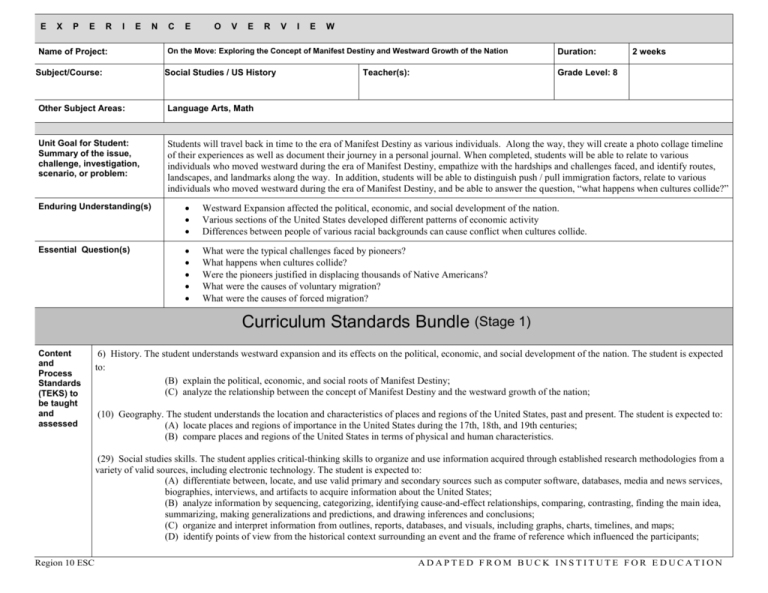
E X P E R I E Name of Project: Subject/Course: N C E O V E R V I E W On the Move: Exploring the Concept of Manifest Destiny and Westward Growth of the Nation Social Studies / US History Teacher(s): Duration: 2 weeks Grade Level: 8 Other Subject Areas: Language Arts, Math Unit Goal for Student: Summary of the issue, challenge, investigation, scenario, or problem: Students will travel back in time to the era of Manifest Destiny as various individuals. Along the way, they will create a photo collage timeline of their experiences as well as document their journey in a personal journal. When completed, students will be able to relate to various individuals who moved westward during the era of Manifest Destiny, empathize with the hardships and challenges faced, and identify routes, landscapes, and landmarks along the way. In addition, students will be able to distinguish push / pull immigration factors, relate to various individuals who moved westward during the era of Manifest Destiny, and be able to answer the question, “what happens when cultures collide?” Enduring Understanding(s) Westward Expansion affected the political, economic, and social development of the nation. Various sections of the United States developed different patterns of economic activity Differences between people of various racial backgrounds can cause conflict when cultures collide. Essential Question(s) What were the typical challenges faced by pioneers? What happens when cultures collide? Were the pioneers justified in displacing thousands of Native Americans? What were the causes of voluntary migration? What were the causes of forced migration? Curriculum Standards Bundle (Stage 1) Content and Process Standards (TEKS) to be taught and assessed 6) History. The student understands westward expansion and its effects on the political, economic, and social development of the nation. The student is expected to: (B) explain the political, economic, and social roots of Manifest Destiny; (C) analyze the relationship between the concept of Manifest Destiny and the westward growth of the nation; (10) Geography. The student understands the location and characteristics of places and regions of the United States, past and present. The student is expected to: (A) locate places and regions of importance in the United States during the 17th, 18th, and 19th centuries; (B) compare places and regions of the United States in terms of physical and human characteristics. (29) Social studies skills. The student applies critical-thinking skills to organize and use information acquired through established research methodologies from a variety of valid sources, including electronic technology. The student is expected to: (A) differentiate between, locate, and use valid primary and secondary sources such as computer software, databases, media and news services, biographies, interviews, and artifacts to acquire information about the United States; (B) analyze information by sequencing, categorizing, identifying cause-and-effect relationships, comparing, contrasting, finding the main idea, summarizing, making generalizations and predictions, and drawing inferences and conclusions; (C) organize and interpret information from outlines, reports, databases, and visuals, including graphs, charts, timelines, and maps; (D) identify points of view from the historical context surrounding an event and the frame of reference which influenced the participants; Region 10 ESC ADAPTED FROM BUCK INSTITUTE FOR EDUCATION (30) Social studies skills. The student communicates in written, oral, and visual forms. The student is expected to: (C) transfer information from one medium to another, including written to visual and statistical to written or visual, using computer software as appropriate; and (D) create written, oral, and visual presentations of social studies information. (31) Social studies skills. The student uses problem-solving and decision-making skills, working independently and with others, in a variety of settings. The student is expected to: (B) use a decision-making process to identify a situation that requires a decision, gather information, identify options, predict consequences, and take action to implement a decision. Other Required Standards to be taught and assessed: (i.e. CCRS, Graduate Expectation s, Local Objectives, etc.) Social Studies: I-Interrelated Discipline and Skills: A(1,3,4), B(3), E(1), F(1-2) II-Diverse Human Perspectives and Experiences: A(2) IV-Analysis, Synthesis, and Evaluation of Information: A(1,3,4), B (1,4) V-Effective Communication: A(1-2) Math: I-Numeric Reasoning: B(1), C(1) IV-Measurement Reasoning: D(1) V-Probabilistic Reasoning: B(2-3), C(1-2) X- Connections: B(1-2) IX-Communication and Representation: A(3) ELA: Listening- I A(1), I C(1), II C(1), D(1) Reading: I B(3 & 4), F(2), II A(3, 4, 5, 8), D(2), E(1-4) Writing: I B(2-4), II B(1-4), F(3), II D(3), E(1-4) Speaking : I A(1), F (1), II C(8), D(3), E(3) Authentic Learning Elements to be integrated: Check all that are targeted in this unit. Provide authentic context that reflects the way the knowledge will be used in real-life X Provide multiple roles and perspectives X Promote articulation X Provide authentic activities X Support collaborative construction of knowledge X Provide coaching and scaffolding X Provide access to expert performances and the modeling of processes X Promote reflection X Provide for authentic assessment of learning within the tasks X 21st Creativity and Innovation (NETS 1) Century Skills/NETS Communication and Collaboration (NETS 2) to be taught and Critical Thinking/Problem Solving (NETS 4) assessed: Region 10 ESC X Information, Media, or ICT Literacy (NETS 3) X X Life and Career Skills X X Digital Citizenship, Technology Operations and Concepts (NETS 5and 6) X ADAPTED FROM BUCK INSTITUTE FOR EDUCATION Major Products Group: & Performances As a group of 3 or more, students will create a character within a group that is moving west. Groups are moving for a variety of push-pull reasons. Students will research the Era of Manifest Destiny using a variety of texts from the library and the Internet. The group culminating activity will be to create a point-of-view journal/diary with both written and picture entries that encompasses their participation in the journey. Students will not only include interactions between the other characters in the group, but will also experience “culture collision” by having an encounter with Native Americans on their trip. Through this “collision,” students will discuss in their journal how this encounter shaped their American identity and experiences in the West Individual: Individual students will research and create their own personal journal that will be reflected in a variety of product outputs: PowerPoint, Video (Youtube or .wmv, Edmodo, Voicethread), and will use a variety of tools to create these outputs (MS Word, or a Flip camera video, Bump, etc), which records their personal challenges and struggles with the move west, and will include various hardships on the way. Students will be required to have a minimum of 20 separate journal entries, with at least 1 discussing an encounter with Native Americans and how this encounter shaped their understanding of what it meant to be American. Assessment (Stage 2) Entry Event to launch inquiry, engage students: Assessments After initial background on Manifest Destiny is established in the traditional classroom, students will be invited to travel back in time to the 19th century and assume a role. The roles could consist of, but are not limited to: a pioneer/homesteader, a Mormon/Religious group family/member, a Native American Indian, a Texas settler, a miner, a railroad laborer, a government official, a Chinese or Irish immigrant, etc. Students will receive an invitation and will meet with their groups and decide on what roles within the group they will create. Students will then create a photo collage timeline in journal format of their experiences, as they journey West. Formative Assessments (During Project) Character creation Character Essay Objective quizzes and tests Summative Assessments (End of Project) Final individual project output with summary of journey **Journaling (through PPT, Voicethread, Edmodo, Animoto, .wmv (can be uploaded to Youtube), hand-made scrapbook/journal/ PPT, or Flip camera video converted to Windows Movie Maker) Photo timeline / scrapbook (journal) Group “culture collision” findings. Presentation of journey to class. Resources Needed Materials: Reflection Methods (Individual, Group, Whole-Class Discussion and/or Whole Class) Survey Region 10 ESC Class notes on Manifest Destiny, textbooks, individual research, computer, scrapbook/ photobook in format student decides to create in (including Prezi, Photostory, Voicethread, Youtube, Movie Maker, etc.). X Focus Group X Fishbowl Discussion ADAPTED FROM BUCK INSTITUTE FOR EDUCATION L E A R N I N G E X P E R I E N C E S ( S T A G E 3 ) STEP 1: ENTRY EVENT- After initial background on Manifest Destiny is established in the traditional classroom, students will be invited to travel back in time to the 19th century and assume a selected role(For Student-On the Move Invite). The roles could consist of, but are not limited to: a pioneer/homesteader, a Mormon/Religious group family/member, a Native American Indian, a Texas settler, a miner, a railroad laborer, a government official, a Chinese or Irish immigrant, etc. Transitioning to the second step, student will form collaborative groups. STEP 2: PROJECT ASSIGNMENT- To set the lesson, students will receive an invitation to travel on a westward excursion. They will also be invited to form groups/families to travel with them on their journey west. Using class time, they will meet with their groups and decide on what roles within the groups they will create using the On The Move! Rubric- Character Creation Sheet and Personal Narrative and On The Move! Character Creation and Essay Rubric documents. STEP 3- In their respective groups, students will plan out the route of their trip (ex: how they will get from their starting point to Independence, MO) while researching push and pull factors that influenced their move west. As well, individual students will research information of westward migration to help them create their own personal journals that will be reflected in a variety of product outputs, which records their personal challenges, struggles, and various hardships with their move west. Using the On The Move! Journal Rubric document as a guideline, students will be required to have a minimum of 20 separate journal entries, of which 4 must be the same date as the rest of the group, where they describe an event on that day from different perspectives. Through their journal entries, they must also discuss at least one “cultural collision”/ encounter (positive or negative) that was made with Native Americans, which contributed to or shaped their American identity and perspective of Manifest Destiny. In effort to portray the lives of those on the Western frontier, students may use the On The Move! Website Resource Guide to assist in character creation and journal articles. STEP 4- Finally, after the project is over, students will share their group’s journey with the class. Students will be able to relate to the causes of migration West and how their group impacted Manifest Destiny. This presentation also allows the class and teacher to ask the students presenting questions to ensure that the objectives are met (8.6C), and to make any suggestion about information that may not have been included, or review parts of the trek that stood out to them most. Region 10 ESC ADAPTED FROM BUCK INSTITUTE FOR EDUCATION
